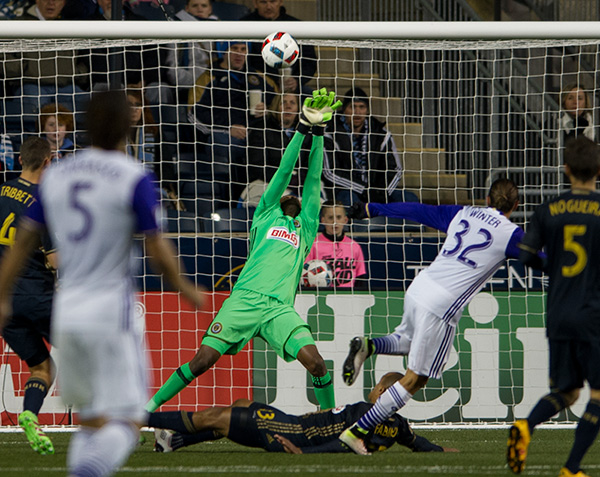Photo: Earl Gardner
Andre Blake is the 2016 MLS goalkeeper of the year.
The Jamaican international was a human highlight reel between the pipes for Philadelphia Union, and in his first full season as a starter he proved both that he belongs and that he has a lot to learn.
Although Blake takes home the award, Bill Reno correctly points out that the Union backstop still has quite a few holes in his game. Reno argues that Blake excels in a single dimension of goalkeeping: Extension saves, and that he is at or below average in almost every other category. A six minute video Reno put together shows fifty plays in which Blake could have done something differently, meaning better. Lowlights include the silly penalty given up to Kaka, the thrilling and ridiculous foot tackle on Bradley Wright-Phillips 30 yards from goal, and the embarrassing playoff opener for Toronto.
Although the video is extremely informative (everybody should check it out), there are few who would contend that Blake was anything close to perfect this season. He struggled to deal with crosses early in the season (though there are notably fewer issues with crosses in Reno’s video as the season progresses), he showed uncertainty coming out to meet players on the break, and — entirely absent from the video — he was fairly crap (I think he’d agree) at kicking the ball.
Given these flaws, Reno suggests that Nick Rimando — who, criminally, has never won GotY — would have been a fair choice this year.
And he’s right. Rimando, like Blake, was a difference-maker on a team that needed to feel confident in their goalie in order to push players forward and earn the points needed to sneak into the playoffs. Rimando’s absurd consistency and leadership allowed RSL to play with relatively inexperienced center backs for much of the season and still earn a postseason berth in the vicious Western Conference. In short, nobody could argue if Rimando won the award.
The travesty is that he was left off the list of finalists to make room for Luis Robles and Tim Howard. Among Robles, Howard, and Blake, the latter should be the clear winner. Neither the Red Bulls goalie and the late season Rapids backstop can claim to have had such a prominent role in guiding their team to the postseason as Blake. Though Blake’s superhuman saves may be the only area in which he truly excels right now, the implications of those saves on the Union’s confidence were clear all season. Philly consistently played a high line and pushed players forward, even as their defense leaked goals. Coaches and players all said they felt empowered to play such a style because of their confidence in Blake.
Reno is likely right when he says that sportswriters don’t know enough about goalkeeping to identify the best goalie in the league. As something of a sportswriter, I would certainly never claim such knowledge, or be able to put together a reel that spotlights some of the nuanced issues Reno identifies in his video.
But Goalie of the Year, like almost every postseason award, is about more than simply identifying the best performer throughout a season. Even though they are often the linchpins that hold fragile teams together, defensive midfielders like Kyle Beckerman and Dax McCarty are rarely considered for postseason awards. Despite being “widely regarded as the man,” Diego Chara will never win the league’s most valuable player award.
Blake was a deserved winner because his sensational shot stopping radiated out into a confidence that allowed the Union to continue attacking even as their defensive shape disintegrated. Earnie Stewart and Jim Curtin wanted to play in an aggressive, active system, and that system allowed a lot of unguarded shots and breakaways, and even when teams shot from distance they often did so without immediate defensive pressure.
Blake was far, far from perfect. And his biggest weakness (which also may be Rimando’s greatest strength), organizing his defense effectively, went unmentioned by Reno. Yet, as Jim Curtin and multiple players noted throughout the season, the confidence his show-stopping ability gave his team, for better or worse, was a big reason they felt they could continue to use their system until the bitter end. It is important, if not necessary, to keep in mind that this was supposed to be a transition year for the Union. If their goal was to make the playoffs, they could have brought in an experienced organizer to help their green back line. Instead (likely still smarting after Nick Sakiewicz Mbohlied a gutter ball) Stewart and Curtin decided to let Blake grow a relationship with talented but raw rookies. The resulting ups, downs, and far downs were to be expected.
It may have been a down year overall for goalies in MLS, but Blake took a huge step forward in his development. When his defense exposed his weaknesses, he often responded with memorable moments that offered them confidence even after the roughest (coughMontrealcough) defeats.
Chris Pontius won the Comeback Player of the Year by rescuing his career from a series of injuries and becoming one of the more complete wingers in MLS. Andre Blake won Goalie of the Year for rescuing the Union’s goalie situation from dismissive mockery, and showing that he has all the tools to become one of the most complete goalies in MLS, and perhaps beyond.


RECENT COMMENTS